
 Tyler Bowen
The Hockey Writers
Tyler Bowen
The Hockey Writers
35
Reads
0
Comments
Penguins with 100-Point Seasons
Few NHL franchises have been blessed with success like the Pittsburgh Penguins on both the individual and team levels. The Penguins have seen several Hall of Famers and five Stanley Cups throughout their history.

Since the team’s inception prior to the 1967-68 NHL season, 12 different skaters have racked up 100 or more points in a single campaign, totaling 34 individual 100-point seasons.
Pierre Larouche & Jean Pronovost
First 100-Point Seasons in Penguins History
Larouche: Scored 111 points in 76 games during the 1975-76 season.
Pronovost: Scored 104 points in 80 games during the 1975-76 season.
There wasn’t a whole lot to get excited about during the first eight seasons in Penguins franchise history. The team reached the postseason just three times with little success and no player had even reached the 90-point mark.
Related: Penguins’ Most Creative Player Nicknames Through the Years
Finally, Pierre Larouche and Jean Pronovost both broke the 100-point barrier in the 1975-76 season with 111 and 104 points, respectively. They were also two of the six NHL players that season to notch at least 50 goals.
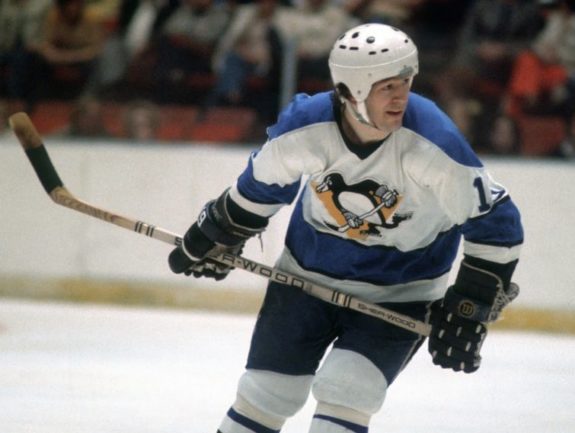
The dynamic duo of Larouche and Pronovost sparked the Penguins’ elite offensive attack; the team finished second in the league with 339 goals scored. However, Pittsburgh’s goaltending group combined for an .883 save percentage, 3.73 goals-against average, and 303 total goals allowed, fifth-most in the NHL.
After a 15-23-5 start to the season, head coach Marc Boileau was fired and replaced with Ken Schinkel, who went 20-10-7 and led the Penguins to a surprise playoff berth. If not for Larouche, Pronovost, and Syl Apps (99 points in 1975-76), the Penguins would’ve been one of the worst teams in the league.
Larouche’s 111-point campaign came in his second NHL season after being selected eighth overall in the 1974 NHL Draft. Meanwhile, the then-30-year-old Pronovost was in his eighth season with Pittsburgh. Neither player would reach the 100-point plateau again in their careers.
Mario Lemieux
Member of the NHL’s 190-Point Club
Scored 100 points in 73 games during the 1984-85 season.
Scored 141 points in 79 games during the 1985-86 season.
Scored 107 points in 63 games during the 1986-87 season.
Scored 168 points in 77 games during the 1987-88 season.
Scored 199 points in 76 games during the 1988-89 season.
Scored 123 points in 59 games during the 1989-90 season.
Scored 131 points in 64 games during the 1991-92 season.
Scored 160 points in 60 games during the 1992-93 season.
Scored 161 points in 70 games during the 1995-96 season.
Scored 122 points in 76 games during the 1996-97 season.
The Penguins went nearly a decade without another 100-point scorer before Mario Lemieux came into the league. One of the most gifted scorers that hockey has ever seen, it’s no surprise that Lemieux leads the franchise with 10 100-point campaigns.
He’s the only skater in franchise history to reach 160 points in a season and he managed to hit that mark four times. The Montreal native also joined Wayne Gretzky as the only other member of the NHL’s 190-point club and is currently second in NHL history with 1.88 points per game through his career.
Related: St. Louis Blues Mount Rushmore
Lemieux racked up 100 or more points in each of his first six NHL seasons, including a 123-point performance during the 1989-90 season where he appeared in just 59 games. He’s still the only player in NHL history to record a 100-point season with fewer than 60 games played. Unfortunately, missed time played far too big of a role in Lemieux’s career.
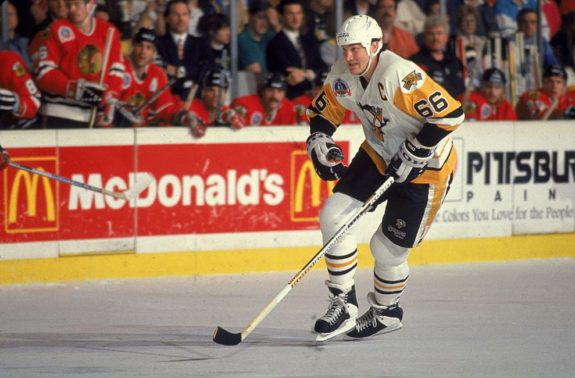
Le Magnifique wasted no time making his mark on the league; he won the Calder Trophy with a 100-point performance during the 1984-85 season. To show just how bad the Penguins were before Lemieux essentially saved the franchise, he recorded a minus-33 rating despite scoring 100 points as a rookie.
The following season, the Penguins still struggled with a 34-38-8 record, but Super Mario jumped up to 141 points in 79 games. From Jan. 11 to March 15, he scored a point in 28-consecutive games, including nine games with three or more points. He earned a runner-up finish in Hart voting.
In his fourth NHL campaign, Lemieux took home his first Hart Trophy after leading the NHL with 70 goals and 168 points during the 1987-88 season. He put together a 17-game point streak throughout January and into February, racking up 19 goals and 37 points during that span. Later in March, he scored 26 points during an eight-game point streak, including back-to-back five-point performances.
Finally, in his fifth NHL season, Lemieux dragged the Penguins into the postseason for the first time in his career. He did it with one of the greatest seasons in NHL history, leading the league with 85 goals and 199 points. Yet, somehow, Gretzky won that season’s Hart Trophy in one of the most confusing awards seasons the league had seen.
Despite not taking home the Hart Trophy, Lemieux was awarded his second consecutive Art Ross Trophy before scoring another 19 points in 11 postseason contests. He also managed to accomplish one of the most impressive feats in hockey history; on New Year’s Eve 1988, the then-23-year-old tallied eight points, including five goals in five different ways: 5-on-5, powerplay, shorthanded, penalty shot, and empty net.
Unfortunately, the Penguins failed to make the postseason again in 1990, partially due to Lemieux missing over 20 games with a back injury. He still managed to score 123 points thanks to a ridiculous 46-game point streak, the second-longest in NHL history.
Lemieux’s back injury progressed into a herniated disk, requiring surgery that would hold him out of all but 26 games during the 1990-91 season. He played through back pain for years, and at times he struggled to stand straight or even tie his laces. Somehow, he came back for the Penguins’ playoff run and scored 44 points en route to a Conn Smythe Trophy and the franchise’s first Stanley Cup win.
The 6-foot-4 center enjoyed a mostly-healthy run during the 1991-92 season; he led the NHL in scoring for the third time with 131 points in 64 games. For the second straight season, Lemieux led the league in postseason scoring as well, tallying 16 goals and 34 points in 15 games. He missed five playoff games with a broken hand but came back to score 12 points in the final six games. The Penguins won the Stanley Cup in a four-game sweep over the Chicago Blackhawks while Lemieux was awarded another Conn Smythe.
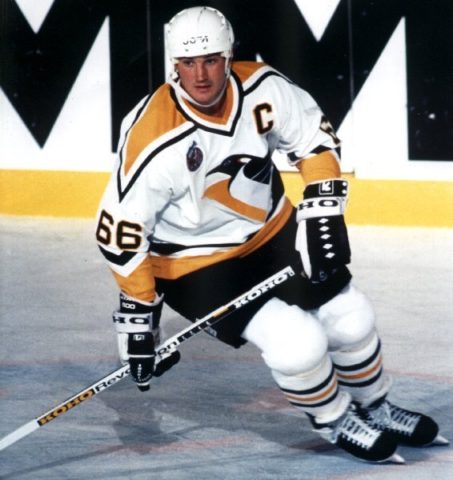
The 1992-93 season was perhaps Lemieux’s most impressive. He didn’t lead the Penguins to another Stanley Cup and he didn’t set a new career-high in scoring. However, he was awarded his second Hart Trophy after racking up 69 goals and 160 points in just 60 games. The reason he missed 20 games that season? He was diagnosed with Hodgkin’s lymphoma and had to begin radiation treatment.
In true Mario Lemieux fashion, on the day of his final radiation treatment, he flew to Philadelphia and scored two points against the rival Flyers. In just 20 games after the radiation treatments, he scored a ridiculous 56 points. His 160 points put him on pace to be the only player besides Gretzky with a 200-point season and potentially even surpass Gretzky’s record of 215 points in a single season.
Lemieux missed nearly 60 games during the 1993-94 season after another back surgery. He took a year off from hockey, citing his fatigue from radiation and his back injuries. Of course, the unstoppable force didn’t skip a beat upon his return; he won his third Hart Trophy after leading the league with 69 goals and 161 points during the 1995-96 season. The Penguins made it to Game 7 of the Eastern Conference Final but fell short to the Florida Panthers.
The 1996-97 season was Lemieux’s final 100-point performance. He scored 50 goals and 122 points, finishing third in Hart voting but leading the league in scoring for the sixth time. He ended the season on a nine-game point streak, notching six goals and 17 points in the process. After being knocked out in the first round of the postseason, Lemieux announced his retirement and was voted into the Hockey Hall of Fame shortly after.
Lemieux accumulated 77 goals and 229 points in 170 games in the 2000s after a three-season retirement following the 1996-97 season. During this time, hockey in Pittsburgh was hanging by a thread and going bankrupt before Super Mario stepped in. Just before returning to the ice, Lemieux purchased the team and saved the franchise once again.
Rob Brown
Scored 115 points in 68 games during the 1988-89 season.
Similar to Larouche, Rob Brown had a massive breakout season as an NHL sophomore. He racked up 49 goals and 115 points in just 68 games during the 1988-89 NHL campaign but never reached the 100-point plateau again.
Brown was one of three Penguins to tally at least 100 points that season, joining Lemieux and Paul Coffey. His 1.69 points per game ranked fifth in the NHL, while his shooting percentage of 29 led the league.
Brown scored another eight points in 11 postseason appearances and, again, led all playoff skaters with a 29.4 shooting percentage. The Ontario native would go on to score 80 points the following season, the second-most of his career.
Paul Coffey
Only Defenseman in Team History with a 100-Point Season
Scored 113 points in 75 games during the 1988-89 season.
Scored 103 points in 80 games during the 1989-90 season.
Before Coffey ever suited up for the Penguins, he had already established himself as one of the best defensemen in the league with the Edmonton Oilers. From 1981-1987, the 6-foot blueliner won two Norris Trophies — he never finished worse than fifth in Norris voting during that stretch — lifted three Stanley Cups, and totaled 637 points in 458 games. That included three seasons with at least 100 points.
Related: NHL’s 500-Goal Club
Coffey and the Oilers had a contract dispute during the 1987 NHL offseason that would end with a trade to Pittsburgh. He tallied 67 points in 46 games throughout an injury-plagued first season with the Penguins. Then, he made history.
The Ontario native became the first Penguins defenseman to post a 100-point season when he pocketed 30 goals and 113 points in 75 games during the 1988-89 season. Coffey started that season red-hot with 21 points in 11 October games.
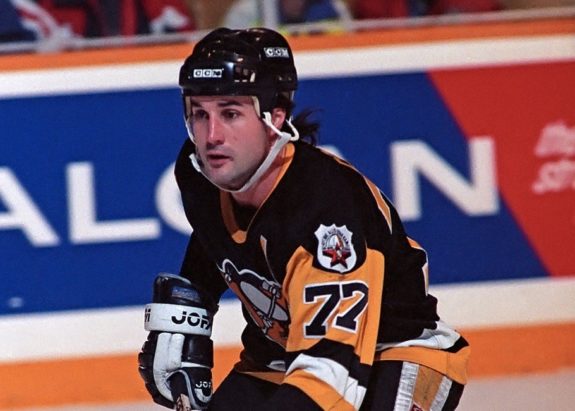
Throughout the season, he had as many games with at least three points (16) as he did scoreless contests. Coffey earned another runner-up finish in Norris voting at the end of the season. In the playoffs, he collected another 15 points in 11 games, including four multi-point efforts.
The following season, Coffey scored over 100 points for the fifth and final time in his Hall of Fame career. His 103 points over 80 games earned yet another top-five Norris finish. The then-28-year-old’s best run came during a 13-game point streak in January and February where he tallied 28 points. With Lemieux missing 21 games that season, the Penguins failed to reach the postseason.
Coffey scored 93 points in the 1990-91 season before helping the Penguins win the Stanley Cup. The following season, he was sent to the Los Angeles Kings in a deal that brought Rick Tocchet, among others, to Pittsburgh.
Mark Recchi
Member of the NHL’s 1,500-Point Club
Scored 113 points in 78 games during the 1990-91 season.
Mark Recchi’s storied NHL career began in Pittsburgh after the Penguins drafted him 67th overall in the 1988 NHL Draft. In just his second full season with the club, the British Columbia native racked up 40 goals and 113 points during the 1990-91 campaign.
Recchi scored another 10 goals and 34 points (second-most on the team) during the 1991 Stanley Cup run. He was on pace for another 100-point campaign the following season before he was traded to the cross-state rival Philadelphia Flyers in the same trade that sent Coffey to the Kings.
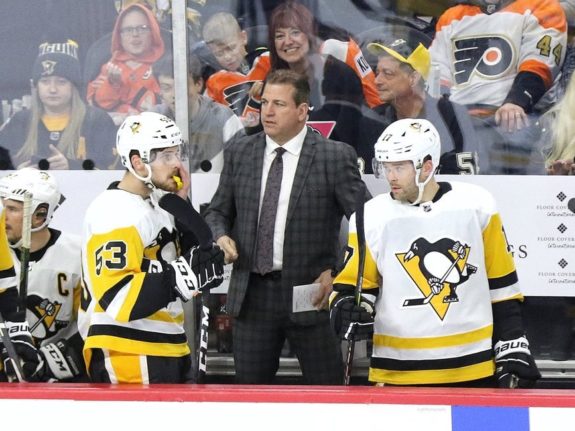
The 5-foot-10 winger recorded two 100-point campaigns with the Flyers as part of the “Crazy Eights” line during the 1992-93 and 1993-94 seasons. After a few seasons with the Montreal Canadiens, Recchi returned to Philadelphia and scored 91 points in 1999-20, his final 90-point performance, while leading the NHL with 63 assists.
Throughout his 22-year NHL career, Recchi would make several stops in Pittsburgh before he was inducted into the Hockey Hall of Fame in 2017. Since 2014, he’s worked as the Penguins’ player development coach and, more recently, the team’s assistant coach for the last three seasons.
Kevin Stevens
Scored 123 points in 80 games during the 1991-92 season.
Scored 111 points in 72 games during the 1992-93 season.
After a stellar four-year career with Boston College, Kevin Stevens made his NHL debut at 22 years old with the Pittsburgh Penguins. The Massachusetts native made steady progress on his point total over his first couple of full NHL seasons; he scored 70 points during the 1989-90 seasons and 86 points in the 1990-91 campaign.
During the 1991 Stanley Cup run, Stevens scored 33 points and led the team with 17 goals. He would ride that momentum into the 1991-92 NHL season where he really put his name on the map.
Stevens’ breakout campaign during the 1991-92 season resulted in his first 100-point performance; the then-26-year-old tallied 54 goals and 123 points across 80 games. He had an impressive 10-game point streak in October and November where he tallied 13 goals and 24 points, including three four-point outings. He later posted an 11-game point streak that included a season-high six points against the Toronto Maple Leafs on Dec. 26.
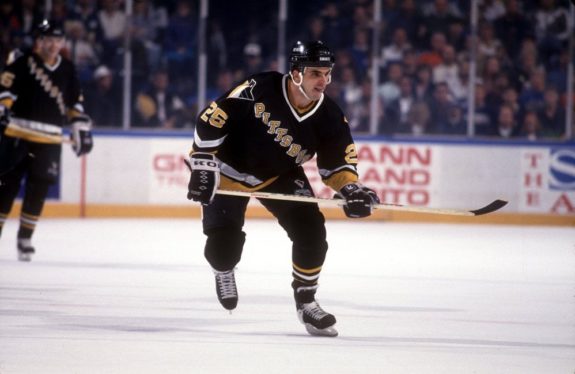
During the team’s second consecutive Stanley Cup win, Stevens totaled 13 goals and 28 points throughout the postseason. He went on to score 111 points during the 1992-93 season with a career-high 55 goals. The 6-foot-3 winger opened the season with a ridiculous 38 points in the first 13 games.
After the 1992-93 season, Stevens never reached the 100-point mark again. He suffered a brutal injury during the 1993 postseason and was traded several times throughout his 15-year NHL career.
Ron Francis
Second-Most Assists in NHL History
Scored 100 points in 84 games during the 1992-93 season.
Scored 119 points in 77 games during the 1995-96 season.
Before he was traded to the Penguins in 1991, Ron Francis had already established himself as one of the league’s best two-way forwards with the Hartford Whalers. He recorded his first 100-point campaign and finished fifth in Selke Trophy voting in 1990, his last full season in Hartford.
Francis tallied 17 points during the Penguins’ 1991 Stanley Cup run and scored another 27 points during the 1992 Cup-winning postseason, including a team-leading 19 assists. That strong playoff performance springboarded him into his first 100-point season with the Penguins in 1992-93; he pocketed 24 goals with 76 assists and opened the season with a 12-game point streak.
The Ontario native narrowly missed the 100-point mark during the 1993-94 season; he tallied 93 points and finished sixth in Selke voting for the second consecutive season. During the lockout-shortened 1994-95, Francis finished on pace for over 100 points (59 points in 44 games) and led the league with 48 assists. Francis won his first and only Selke Trophy that season.
Finally, in his age-32 season, Francis set new career marks with 119 points and a league-leading 92 assists. He had as many games with three or more points (19 times) as he had scoreless games that season. The following season, Francis recorded his seventh and final 90-point season.
At the end of his 23-year career, Francis had racked up 1,249 assists, second-most all-time behind only Gretzky. The Hall of Fame forward has since led the front office of two NHL teams: the Carolina Hurricanes and the still-unnamed Seattle franchise.
Rick Tocchet
Scored 109 points in 80 games during the 1992-93 season.
As mentioned, Tocchet was acquired from the Flyers in a trade that involved Recchi and Coffey during the 1991-92 season. He was known more for his physical presence and “enforcer” style of play than his scoring ability; for his career, Tocchet would end with 2,970 penalty minutes compared to 952 points in over 1,100 games.
Tocchet scored 14 goals and 30 points in 19 games with the Penguins after the trade and then added on another 19 points during the 1992 Stanley Cup run.
The 6-foot winger’s first and only 100-point campaign came the following season where he racked up 48 goals and 109 points in 80 appearances. It took a massive late-season to get there, though. With 80 points in 66 games, Tocchet ended the season on a 14-game point streak where he tallied 12 goals and 29 points.
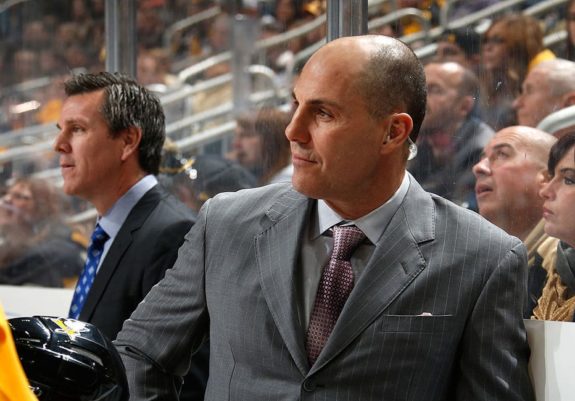
Tocchet bounced around with several NHL franchises until 2002 and later moved behind the bench. He was an assistant coach with the 2016 and 2017 Stanley Cup-winning Penguins before being named the Arizona Coyotes’ head coach during the 2017 offseason.
Jaromir Jagr
Second All-Time Scorer in NHL History
Scored 149 points in 82 games during the 1995-96 season.
Scored 102 points in 77 games during the 1997-98 season.
Scored 127 points in 81 games during the 1998-99 season.
Scored 121 points in 81 games during the 2000-01 season.
One of the most idolized Penguins of all-time, it’s crazy to think that Jaromir Jagr only had four 100-point campaigns with the Penguins. However, he did have four more 90-point seasons and a league-best 70 points during the lockout-shortened 1994-95 season, where he most likely would’ve cleared the 100-point mark by a decent margin.
While Jagr didn’t record his first 100-point season until his sixth NHL campaign, his point totals steadily rose throughout those years. Starting with his 1990-91 rookie season, the 6-foot-3 winger recorded point totals of 57, 69, 94, 99, and 70 (lockout season) before finally breaking the seal in 1995-96.
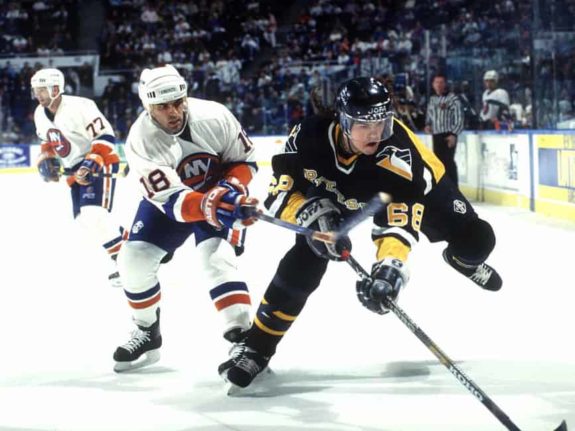
Jagr racked up 62 goals and 149 points during the 1995-96 season. Each of those totals were second in the NHL behind his Penguins teammate Mario Lemieux. His most impressive run that season came in February and March where he recorded 10 consecutive multi-point games; he scored nine goals and 26 points during that span. He then started the postseason on an 11-game point streak, but he was held scoreless three times in the Eastern Conference Final loss to Florida.
The following season, despite only playing 63 games, Jagr narrowly missed the 100-point mark; he finished the 1996-97 campaign with 47 goals and 95 points. The Czech winger scored another eight points in the postseason, but the Penguins were quickly knocked out in five games by the Flyers.
Jagr then went on a four-year heater, racking up three 100-point campaigns and leading the NHL in scoring all four seasons. He finished top-three in Hart voting all four years but won just one time in 1998-99. Over those four seasons, he scored 173 goals and 446 points in 302 contests.
In his age-26 season, Jagr earned his first and only Hart Trophy after scoring 44 goals and 127 points. He ended the regular season with points in 19 of his final 22 games, totaling 37 points in the process. He scored another 12 points in nine playoff games, but the Penguins were bounced in the second round by the Maple Leafs.
Jagr’s final 100-point campaign with Pittsburgh came during the 2000-01 season. He scored 52 goals and 121 points, resulting in a third-place finish in Hart Trophy voting. He totaled 31 points during a 16-game point streak in January and February. The Penguins reached the Eastern Conference Final despite Jagr scoring just 12 points in 16 postseason contests.
Jagr was traded to the Washington Capitals after the 2000-01 season and would go on to suit up for eight different NHL franchises after leaving Pittsburgh. However, he recorded just one more 100-point season in his career; in his age-33 season, Jagr tallied 123 points with the New York Rangers.
Sidney Crosby
Second-Most Points in Franchise History
Scored 102 points in 81 games during the 2005-06 season.
Scored 120 points in 79 games during the 2006-07 season.
Scored 103 points in 77 games during the 2008-09 season.
Scored 109 points in 81 games during the 2009-10 season.
Scored 104 points in 80 games during the 2013-14 season.
Scored 100 points in 79 games during the 2018-19 season.
Much like his predecessor Mario Lemieux, Sidney Crosby arrived in Pittsburgh during one of the franchise’s brutal low-points and turned the ship around. From 2002-2006, the Penguins picked in the top-5 of the NHL Draft each season, including four in the top-2. Crosby was the top selection in the 2005 NHL Draft — where the Penguins also snagged Kris Letang in the third round — and brought the team to the Stanley Cup Final in just his third season.
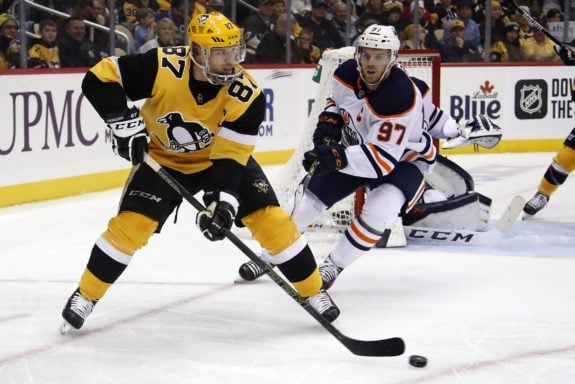
Crosby wasted no time making his mark on the league. He scored 39 goals and 102 points as a rookie, finishing second in Calder voting behind Alex Ovechkin’s 50-goal, 100-point campaign. The Penguins still finished among the league’s worst teams as the 18-year-old rookie was the only skater on the team to even reach the 60-point mark.
The following season, Crosby took home his first Hart Memorial Trophy at just 19 years old, tying Gretzky as the youngest Hart winner in league history. The Nova Scotia native tallied 36 goals and a league-leading 120 points which remains his career-best. He led the Penguins to their first playoff appearance since 2001 but they were quickly bounced by the Ottawa Senators in the first round.
Unfortunately, Crosby’s career followed Lemieux’s path when it came to injuries as well. That began during the 2007-08 season where he missed nearly 30 games with an ankle sprain. He finished the regular season with 72 points in 53 games. On the bright side, he returned in time for a strong playoff run, leading the league with 27 postseason points before falling to the Detroit Red Wings in the Stanley Cup Final.
Crosby stayed healthy over the next two seasons, scoring 103 and 109 points, respectively, during the 2008-09 and 2009-10 campaigns. Near the end of the 2008-09 season, the 5-foot-11 center went scored 27 points during a 16-game point streak. That momentum carried him into the postseason where he scored another 31 points in 24 games, leading the Penguins to their first Stanley Cup since 1992.
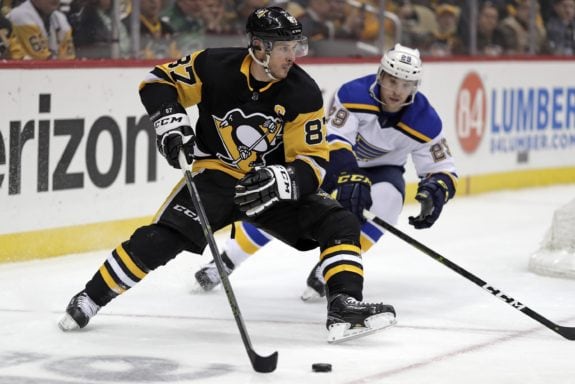
The following season, he earned his first Rocket Richard Trophy with 51 goals. He finished third in Hart voting and tied for second in the NHL with 109 points. Crosby scored another 19 points in 13 postseason contests before getting knocked out in the second round.
The injury bug caught Crosby again from 2010-2012; he missed over 100 games between two seasons with concussions and post-concussion issues. During that time, he still managed 103 points in 63 games and it’s not crazy to think he would’ve had at least 100 points in each of those seasons if he avoided injury.
After the lockout-shortened 2012-13 campaign — Crosby finished second in Hart voting and was on pace for another 100-point season after scoring 56 points in 36 games that season — the star center returned to the 100-point club in 2013-14. He won his second Hart Trophy with 36 goals and a league-leading 104 points. However, he fell flat in the playoffs with just nine points in 13 contests.
Over the next four seasons, Crosby would score between 84-89 points each season. He won another Rocket Richard, finished top-5 in Hart voting three times (including two runner-up finishes), and won back-to-back Conn Smythe Trophies after the Penguins won the Stanley Cup in 2016 and 2017.
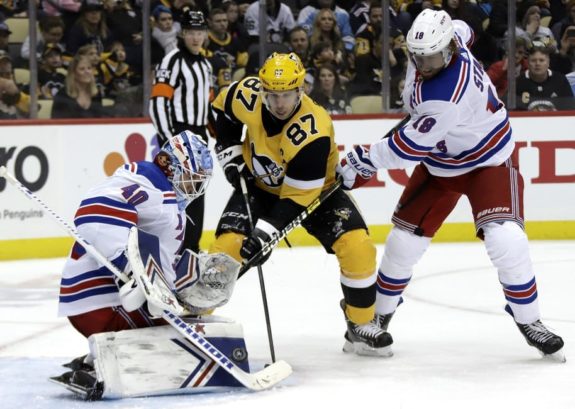
For the fourth time in his career, Crosby finished runner-up for Hart Trophy after scoring 35 goals and 100 points during the 2018-19 campaign. He tallied 38 points in the final 27 contests but was held to just one postseason assist as the Penguins were swept in the first round by the New York Islanders.
Despite missing serious time during the early peak of his career, Crosby has been one of the most dominant forces in the NHL for most of the last 15 years. He’s filled the trophy case, both on a personal and team level, and morphed his game into a complete, well-rounded skill set.
Evgeni Malkin
Scored 106 points in 82 games during the 2007-08 season.
Scored 113 points in 82 games during the 2008-09 season.
Scored 109 points in 75 games during the 2011-12 season.
Finally, often seen as the Robin to Sidney Crosby’s Batman, there’s Evgeni Malkin. Drafted second overall behind Ovechkin in 2004, the Russian center won the Calder Trophy in 2007 with 33 goals and 85 points. He followed that up with his first 100-point performance in his second NHL season.
Malkin finished second in Hart voting for the 2007-08 season after scoring 47 goals and 106 points, trailing only Ovechkin’s 112 points for the league lead. He began the season with at least one point in 20 of his first 22 games and later scored 24 points during a 10-game point streak in February. The 6-foot-3 forward racked up another 22 postseason points before the Penguins fell to the Red Wings in the Stanley Cup Final.

For the second season in a row, Malkin was the runner up for the Hart Trophy behind Ovechkin, but this time he at least took home the Art Ross, leading the NHL with 113 points. He pocketed 35 goals and recorded three separate point streaks of at least nine games. Malkin then caught fire in the postseason, leading the Penguins to a Stanley Cup victory with 36 points in 24 games, earning him the Conn Smythe Trophy.
His next 100-point season was arguably his best individual season; Malkin recorded his first 50-goal season, led the NHL with 109 points, and finally won the Hart Trophy for the 2011-12 campaign. He shredded opposing teams down the stretch with 28 points in his final 15 games.
From 2013-17, Malkin had trouble staying on the ice due to injuries. He missed 80 total games during that stretch — an average of 20 per season — and had a chance at 100-point performances in 2013-14 and 2016-17; he was on pace for at least 95 points in each of those seasons.
Since the 2011-12 season, Malkin has been chasing his fourth 100-point campaign. He came within spitting distance in 2017-18 with 98 points and his 1.35 points per game in 2019-20 had him on pace for roughly 110 points in a full season.

With some of the greatest players in NHL history leading the way, the Penguins have been one of the most successful teams over the last 30 years, on both individual and team levels. Crosby and Malkin are still going strong while someone like Jake Guentzel could be the next name to pop up on this list in the near future.
The post Penguins with 100-Point Seasons appeared first on The Hockey Writers.
Popular Articles

















































 Blackhawks Chicago
Blackhawks Chicago Panthers Florida
Panthers Florida Penguins Pittsburgh
Penguins Pittsburgh Rangers New York
Rangers New York Avalanche Colorado
Avalanche Colorado Kings Los Angeles
Kings Los Angeles Maple Leafs Toronto
Maple Leafs Toronto Bruins Boston
Bruins Boston Capitals Washington
Capitals Washington Flames Calgary
Flames Calgary Oilers Edmonton
Oilers Edmonton Golden Knights Vegas
Golden Knights Vegas Flyers Philadelphia
Flyers Philadelphia Senators Ottawa
Senators Ottawa Lightning Tampa Bay
Lightning Tampa Bay Red Wings Detroit
Red Wings Detroit Islanders New York
Islanders New York Sabres Buffalo
Sabres Buffalo Devils New Jersey
Devils New Jersey Hurricanes Carolina
Hurricanes Carolina Stars Dallas
Stars Dallas Jets Winnipeg
Jets Winnipeg Blue Jackets Columbus
Blue Jackets Columbus Predators Nashville
Predators Nashville Wild Minnesota
Wild Minnesota Blues St. Louis
Blues St. Louis Mammoth Utah
Mammoth Utah Ducks Anaheim
Ducks Anaheim Sharks San Jose
Sharks San Jose Canucks Vancouver
Canucks Vancouver






